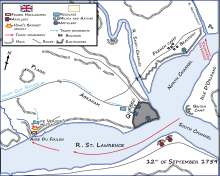Sometimes bureaucracy is not a problem. Sometimes it solves previously unsolvable problems. Sometimes, it changes the world. Twenty minutes outside the French-Canadian city of Quebec changed the course of the Seven Years' (French and Indian) War. And bureaucracy made it possible for the English to be there, when they needed to be there, to launch the decisive blow.
For the British it was part of the "Annus Mirabilis", but miracles don't just happen. The British Navy had slowly, systematically, mapped the treacherous waters of the St. Lawrence. They intercepted French fire ships and ran them aground. They probed for a landing site, and failed. But eventually they found one, upriver at the base of a bluff. A small French force was defeated, and the British moved up the the plains

of Abraham. The French Army set up to face them. The British Army were in no position to retreat. They would either win, or die.
The French troops outnumbered them, but they hadn't finished training or integrating local troops into the professional army. They were worn down. An while skirmisher lines inflicted casualties, the main body of British and Colonial troops were pros. They held their ground. They followed their orders. They wanted to lead the main body of the French forces to come to them.

The French obliged. The British had double-loaded their muskets, to deliver twice the firepower. But it was a trick they could only use once. They had to wait in place as the French fired, and again, and again, moving forward the whole time. But the British were regulars. This is what they trained for.
Finally the French were close enough to feel the full effect. Call it thirty yards. On command, the British forces fired as one, moved forward through the smoke, reloaded and fired again. Two hundred forty seconds. The French line collapsed, and the survivors began to retreat to the city. Both sides lost their commanding generals in that volley. Both became more disorganized. But the French were in shock, and the British advanced to positions where they could maintain the full siege of the city. Without a source of supplies, without a commanding general, the French eventually surrendered.
The war wasn't over for another year, but the tide had clearly turned. And that's why the eastern side of North America remained British, and eventually American. It may even have contributed, a little, to the willingness of the French to sell the Louisiana territory, fifty years later. And when a student tells me that violence never settles anything, I tell them to read history. There's luck, and preparation. There's friction. But brief moments can change the world.
America Was 20 Minutes Away From Being French - The Daily Beast
No comments:
Post a Comment